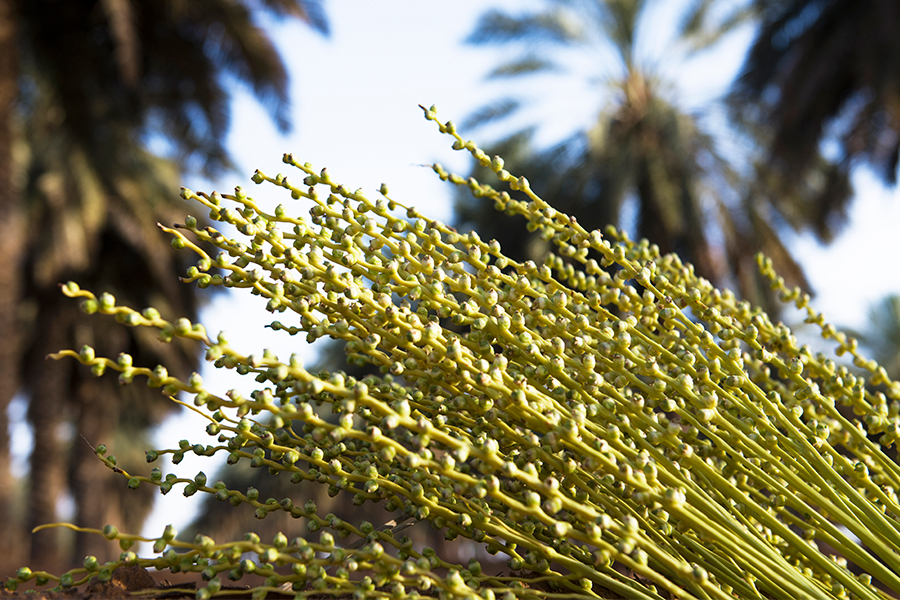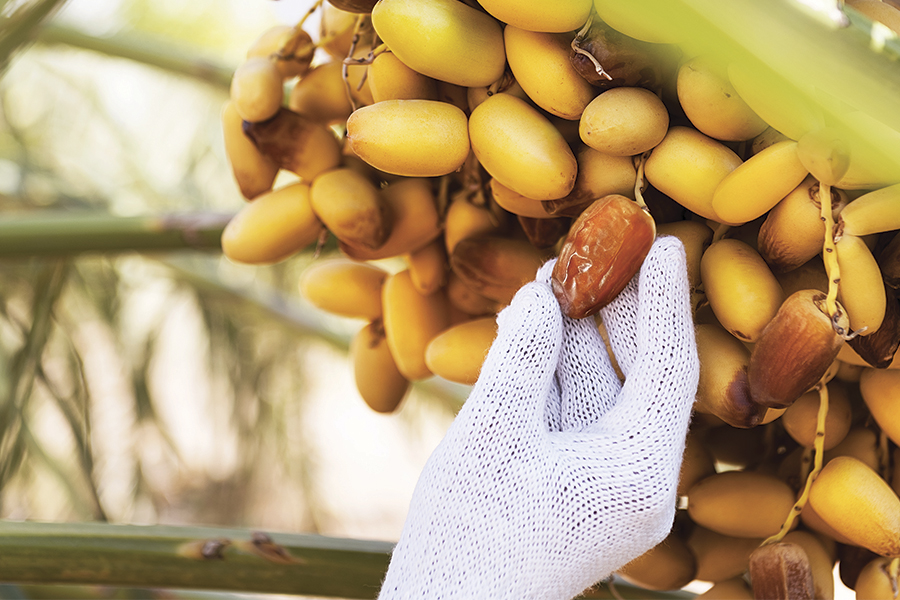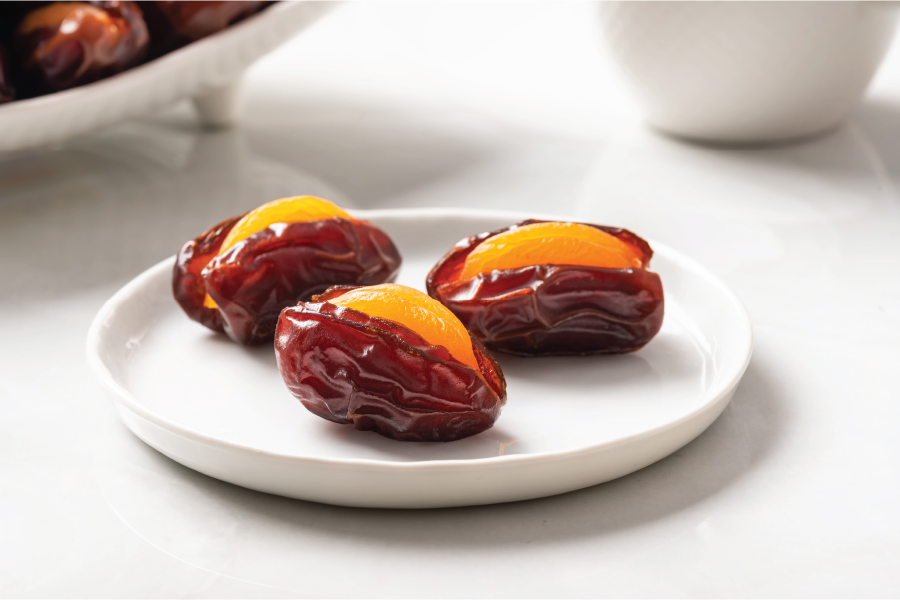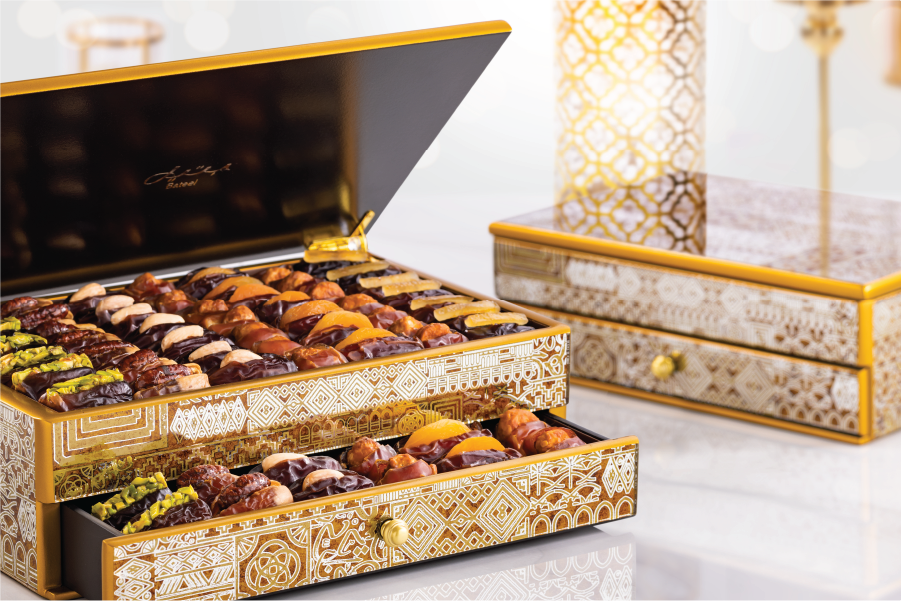
Bateel dates present an inimitable flavour, enhanced by nature’s bounty and an incredible terroir. At our exclusive organic date groves, nestled beside the historic valleys of Al Ghat in Saudi Arabia, Bateel farmers uphold centuries-old farming practices.
Moisture content is the main difference between fresh and dry dates, which changes through the ripening stage.
Bateel’s farmers scale the palm trees several times over summer’s harvest season, carefully selecting each date only when perfectly ripe just as their ancestors did. As soon as the dates are harvested, they are carefully stored to prevent further ripening and lock in the fruit’s luscious flavours.
HOW DATES RIPEN
Dates can take around seven months to ripen once it emerges from its spathe or casing on the tree. Each fruit undergoes four main stages of development that include:
Kimri
Around four months after pollination, the fruit grows into a green and rigid form. At this stage, it can be quite bitter in taste as the natural sugars are still developing and a high 80 percent of moisture is present. Branches of our date palms are regularly thinned, even if it means cutting away 50 percent of the fruit. The thinning process ensures optimum air circulation and space, so the remaining fruits grow to their best potential.
Khalal
About a month later, the dates are fully grown in size but are still hard. Its colours transform into different shades of orange, yellow and red depending on the variety, with rising levels of sugars. Some yellow dates at this point also become soft to the touch, a sign they are ready to eat. Its moisture content is approximately 60 percent at this stage.
Rhutab
Over the next four weeks, the dates are close to becoming ripe. Fresh dates are best at the rhutab stage. They begin to soften and turn shades of light brown, with the tannins breaking down and sugars released. Available to order fresh from Bateel Boutiques, rhutab dates are deliciously soft, juicy with a moisture content of around 40 percent making it an inimitable treat. These dates need to be stored in a cool temperature to maintain its freshness. Some of the date varieties harvested at this stage are Medjool, Kholas, Sokari and Bateel’s signature Wanan.
Tamar
In another couple of weeks, the date fruit is officially ripe with 25 percent of moisture level. Most dates are harvested at the tamar stage. Depending on the variety, the dates can be soft or dry in texture but they each boast complex, sweet and irresistible flavours. Most Bateel date varieties are harvested at this stage, including Ajwa, Khidri, Kholas, Medjool, Segai and Sokari.

NUTRITION & SHELF LIFE
Every stage of the fruit’s development sees its moisture content and natural sugars transform dramatically. During the initial kimri stage, water levels are at nearly 84%, while total sugars are only 6%. Subsequent stages see the moisture content reduce as the sugars become more concentrated – khalal (66% moisture | 27% sugars), rhutab (43% moisture | 45% sugars) and tamar (24% moisture | 51% sugars).
While increased sugars translates to higher calories, a healthy, well-rounded diet with a balance of macronutrients and micronutrients is what’s important. The word ‘macro’ means large and these nutrients are classified in three ways – carbohydrates, fats and proteins. Micronutrients, as its name suggests, are smaller and common examples include calcium, iron, zinc, vitamin C and more.
Fresh dates, straight from the harvest, are a nutritious treat. On average, two fresh dates (around 50g) contain around 70 calories, while similar servings of dry dates contain double the amount at about 140 calories. Similar servings of fresh dates also contain around 1g of protein, 0.5g of fat, 18g of carbohydrates and 1.75g of fibre, as well as several vitamins and minerals.
Since dry dates often contain significantly less moisture compared to fresh dates, that also means they can retain their flavours for a longer period of time. Fresh varieties, in comparison, are best enjoyed right away, but can also be kept refrigerated for up to six to eight months.
Bateel specialises in fresh dates, harvesting the fruits when they reach the prime rhutab and tamar phases. If you’d like to learn more about the different types of dates available, read our guide to Bateel’s seven organic date varieties.

